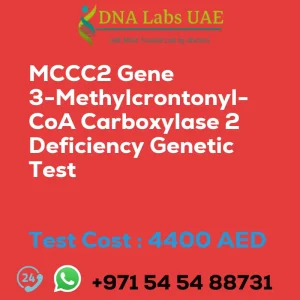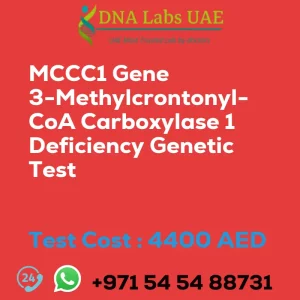PCCA Gene Propionic Acidemia Genetic Test
Cost: 4400.0 AED
Test Components:
- Sample Condition: Blood or Extracted DNA or One drop Blood on FTA Card
- Report Delivery: 3 to 4 Weeks
- Method: NGS Technology
- Test Type: Metabolic Disorders
- Doctor: General Physician
- Test Department: Genetics
Pre Test Information:
Clinical History of Patient who is going for PCCA Gene Propionic Acidemia NGS Genetic DNA Test. A Genetic Counselling session to draw a pedigree chart of family members affected with Propionic Acidemia.
Test Details:
Propionic Acidemia (PA) is a rare genetic disorder characterized by the inability to break down certain proteins and fats properly. This results in the buildup of toxic substances, including propionic acid, in the body. The PCCA gene is one of the genes associated with propionic acidemia. Mutations in this gene can lead to a deficiency in the enzyme propionyl-CoA carboxylase, which is responsible for breaking down propionic acid.
NGS (Next-Generation Sequencing) genetic testing is a method used to analyze multiple genes simultaneously to identify mutations or variations that may be associated with a particular condition. In the case of propionic acidemia, NGS genetic testing can be used to detect mutations in the PCCA gene. This type of genetic testing involves obtaining a DNA sample, usually through a blood sample or cheek swab, from the individual being tested. The DNA is then sequenced using advanced technology that can rapidly analyze the genetic code.
The results of the test can help diagnose propionic acidemia and determine the specific genetic mutation causing the condition. Genetic testing for propionic acidemia can be helpful in confirming a diagnosis, providing information about the specific mutation causing the condition, and assisting with genetic counseling and family planning. It can also be used to identify carriers of the condition, as propionic acidemia is an autosomal recessive disorder.
It is important to note that genetic testing for propionic acidemia should be performed by a qualified healthcare professional or genetic counselor who can interpret the results and provide appropriate guidance and support.
| Test Name | PCCA Gene Propionic acidemia Genetic Test |
|---|---|
| Components | |
| Price | 4400.0 AED |
| Sample Condition | Blood or Extracted DNA or One drop Blood on FTA Card |
| Report Delivery | 3 to 4 Weeks |
| Method | NGS Technology |
| Test type | Metabolic Disorders |
| Doctor | General Physician |
| Test Department: | Genetics |
| Pre Test Information | Clinical History of Patient who is going for PCCA Gene Propionic acidemia NGS Genetic DNA Test A Genetic Counselling session to draw a pedigree chart of family members affected with Propionic acidemia |
| Test Details |
Propionic acidemia (PA) is a rare genetic disorder characterized by the inability to break down certain proteins and fats properly. This results in the buildup of toxic substances, including propionic acid, in the body. The PCCA gene is one of the genes associated with propionic acidemia. Mutations in this gene can lead to a deficiency in the enzyme propionyl-CoA carboxylase, which is responsible for breaking down propionic acid. NGS (Next-Generation Sequencing) genetic testing is a method used to analyze multiple genes simultaneously to identify mutations or variations that may be associated with a particular condition. In the case of propionic acidemia, NGS genetic testing can be used to detect mutations in the PCCA gene. This type of genetic testing involves obtaining a DNA sample, usually through a blood sample or cheek swab, from the individual being tested. The DNA is then sequenced using advanced technology that can rapidly analyze the genetic code. The results of the test can help diagnose propionic acidemia and determine the specific genetic mutation causing the condition. Genetic testing for propionic acidemia can be helpful in confirming a diagnosis, providing information about the specific mutation causing the condition, and assisting with genetic counseling and family planning. It can also be used to identify carriers of the condition, as propionic acidemia is an autosomal recessive disorder. It is important to note that genetic testing for propionic acidemia should be performed by a qualified healthcare professional or genetic counselor who can interpret the results and provide appropriate guidance and support. |








